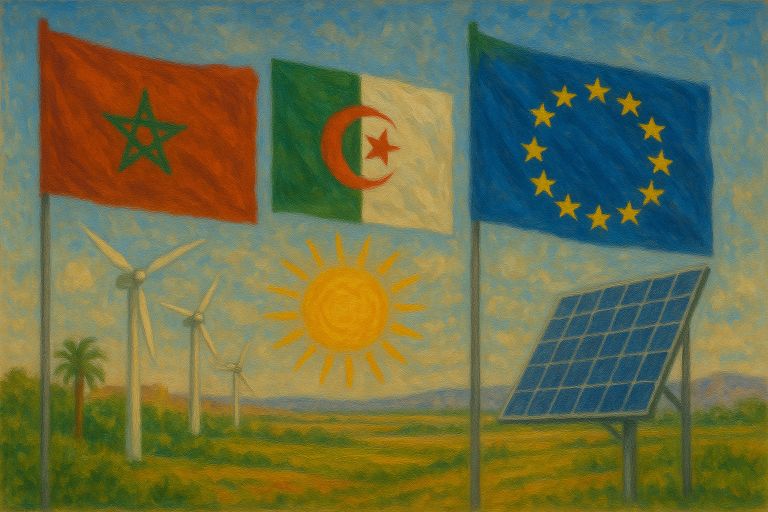Introduction: The Southern Neighbourhood in Flux
The political landscape of North Africa remains in constant flux, characterized by stalled democratic transitions, persistent economic fragility, and intensifying geopolitical competition. Tunisia, Algeria, and Morocco—each navigating distinct phases of political transformation—face governance challenges and mounting social pressures that reverberate throughout the Mediterranean basin. For the European Union, these evolving dynamics directly shape critical policy priorities, including migration management, energy diversification strategies, and broader regional stability concerns.
Tunisia: Between Authoritarian Consolidation and Popular Discontent
Governance Crisis: President Kais Saied's July 2021 constitutional coup fundamentally dismantled Tunisia's democratic institutions, concentrating unprecedented executive power within the presidency. The systematic erosion of judicial independence and parliamentary oversight has left the country's democratic framework severely compromised, marking a dramatic reversal from its post-2011 transition trajectory.
Socio-Economic Deterioration: Persistent inflation, chronic unemployment—particularly among university graduates—and stringent IMF-imposed structural reforms have intensified public dissatisfaction across Tunisian society. Youth unemployment rates exceeding 35% have created a generation increasingly disconnected from formal political processes and economic opportunities.
Regional Spillover Effects: Tunisia's institutional weaknesses have significantly undermined its capacity to serve as a reliable partner in EU migration frameworks. Contested bilateral agreements on migrant returns and border control mechanisms reflect deeper governance deficits that limit the country's ability to implement sustained policy commitments.
Algeria: Hydrocarbon Leverage and Political Paralysis
Energy as Strategic Capital: Europe's accelerated pivot away from Russian energy supplies following the 2022 invasion of Ukraine has dramatically enhanced Algeria's geopolitical positioning. Increased European dependence on Algerian natural gas exports has provided Algiers with considerable short-term diplomatic and economic leverage, though this advantage remains vulnerable to global energy market shifts.
Institutional Stagnation: Despite the transformative potential of the 2019-2021 Hirak protest movement, Algeria's political architecture remains fundamentally unchanged. The military-security establishment continues to dominate decision-making processes, while meaningful institutional reforms remain limited and transparency mechanisms virtually absent.
Security Vulnerabilities: Domestic political repression, increasingly porous borders with Sahel states experiencing security crises, and unresolved territorial disputes with Morocco collectively weaken prospects for meaningful regional cooperation and sustainable stability.
Morocco: Controlled Liberalization and Strategic Diversification
Monarchical Adaptation: The Moroccan monarchy has demonstrated remarkable resilience in managing domestic dissent while projecting an international image of gradual democratic reform. Although civil liberties remain significantly constrained, political institutions operate with relative stability compared to regional counterparts, enabling consistent policy implementation.
Youth Demographics and Migration Pressures: Persistent unemployment among educated youth continues to generate substantial migration pressures, encompassing both regular labor migration and irregular border crossings. Graduate unemployment rates approaching 25% sustain these demographic flows despite economic growth in certain sectors.
Strategic Positioning: Morocco has successfully positioned itself as an indispensable EU partner across multiple domains—trade liberalization, renewable energy development (particularly solar and emerging green hydrogen projects), and migration management cooperation. Simultaneously, Rabat maintains carefully balanced relationships with Gulf monarchies and has normalized ties with Israel, demonstrating sophisticated diplomatic diversification.
Regional Dynamics: From Maghreb Fragmentation to Mediterranean Stakes
Intra-Regional Tensions: The persistent Algeria-Morocco rivalry, particularly over Western Sahara sovereignty claims, continues to obstruct any revival of the Arab Maghreb Union and prevents meaningful economic integration across the region. These bilateral tensions limit collective responses to shared challenges and reduce the Maghreb's overall strategic coherence.
Migration Corridor Dynamics: Political instability in Tunisia combined with labor market stagnation throughout Morocco sustains irregular migration routes toward European shores. These persistent flows intensify EU pressure to negotiate increasingly comprehensive bilateral migration management agreements, often with limited consideration for root causes.
Climate Security Nexus: Accelerating desertification patterns and intensifying water scarcity are exacerbating existing socio-political fragilities across the region. North Africa's environmental crisis is becoming increasingly linked to broader Mediterranean concerns regarding food security, energy stability, and demographic movements.
Strategic Implications for EU-Maghreb Relations
Migration Management Challenges: While migration control and border management remain the EU's most immediate policy priorities, bilateral agreements frequently lack durability due to persistent domestic instability in partner countries. Short-term agreements often fail to address underlying drivers of migration flows.
Energy Diversification Opportunities: Strengthened energy partnerships with Algeria and Morocco offer significant potential for European supply diversification, though long-term reliability remains uncertain without accompanying governance reforms and political stabilization in producing countries.
Climate Cooperation Potential: Collaborative frameworks focused on climate adaptation and green economic transition represent potentially stabilizing policy areas. Investment in renewable energy infrastructure and climate adaptation financing could provide sustainable foundations for enhanced cooperation.
Conclusion: The Mediterranean as an Integrated Political Space
The political trajectories of Tunisia, Algeria, and Morocco cannot be understood as isolated national developments but rather as interconnected drivers of broader Mediterranean political dynamics. Domestic governance challenges, evolving youth aspirations, and complex security calculations across the Maghreb will continue to generate spillover effects throughout the Mediterranean basin.
For the European Union, developing a comprehensive strategic approach—one that balances immediate migration control imperatives with sustained support for governance improvements, economic diversification initiatives, and climate resilience building—will prove essential for constructing a stable and mutually beneficial Mediterranean political order. The success of this approach will ultimately depend on the EU's capacity to move beyond transactional relationships toward genuine partnership frameworks that address the root causes of regional instability.

